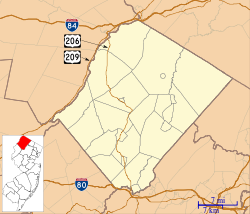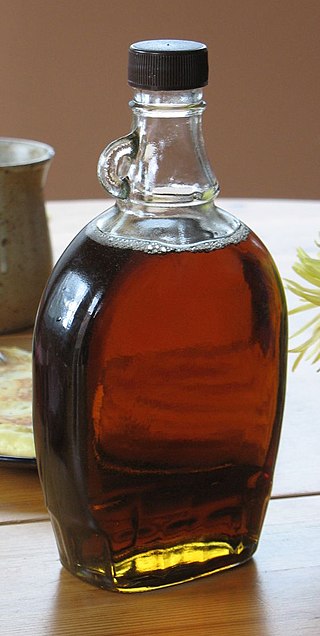
Maple syrup is a syrup made from the sap of maple trees. In cold climates, these trees store starch in their trunks and roots before winter; the starch is then converted to sugar that rises in the sap in late winter and early spring. Maple trees are tapped by drilling holes into their trunks and collecting the sap, which is processed by heating to evaporate much of the water, leaving the concentrated syrup.

Sussex County is the northernmost county in the U.S. state of New Jersey. Its county seat is Newton. It is part of the New York metropolitan area and is part of New Jersey's Skylands Region. As of the 2020 census, the county was the state's 17th-most-populous county, with a population of 144,221, a decrease of 5,044 (−3.4%) from the 2010 census count of 149,265, which in turn reflected an increase of 5,099 (+3.5%) over the 144,166 persons at the 2000 census. Based on 2020 census data, Vernon Township was the county's largest in both population and area, with a population of 22,358 and covering an area of 70.59 square miles (182.8 km2). The county is part of the North Jersey region of the state.

Morris County is a county located in the U.S. state of New Jersey, about 30 mi (48 km) west of New York City. According to the 2020 census, the county was the state's tenth-most populous county, with a population of 509,285, its highest decennial count ever and an increase of 17,009 (+3.5%) from the 2010 census count of 492,276, which in turn reflected an increase of 22,064 (+11.6%) from the 470,212 counted in the 2000 census, Morris County is part of the New York metropolitan area and is divided into 39 municipalities, with many commuter towns but no large cities. Its county seat is Morristown, in the southeast. The most populous place was Parsippany-Troy Hills Township, with 56,162 residents at the time of the 2020 census, while Rockaway Township covered 45.55 square miles (118.0 km2), the largest total area of any municipality. The county is part of the North Jersey region of the state.

Bergen County is the most populous county in the U.S. state of New Jersey. Located in the northeastern corner of New Jersey, Bergen County and its many inner suburbs constitute a highly developed part of the New York City metropolitan area, bordering the Hudson River; the George Washington Bridge, which crosses the Hudson, connects Bergen County with Manhattan. The county is part of the North Jersey region of the state.

West Amwell Township is a township in Hunterdon County, in the U.S. state of New Jersey. As of the 2020 United States census, the township's population was 3,005, a decrease of 835 (−21.7%) from the 2010 census count of 3,840, which in turn reflected an increase of 1,457 (+61.1%) from the 2,383 counted in the 2000 census.

Harding Township is a township in Morris County, in the U.S. state of New Jersey. It is located in the Passaic Valley region within the New York Metropolitan area. The township was formed as a township by an act of the New Jersey Legislature on September 1, 1922, from portions of Passaic Township, based on the results of a referendum passed on May 9, 1922. As of the 2020 United States census, the township's population was 3,871, an increase of 33 (+0.9%) from the 2010 census count of 3,838, which in turn reflected an increase of 658 (+20.7%) from the 3,180 counted in the 2000 census.

Vernon Township is a township in Sussex County, in the U.S. state of New Jersey. It is located about a one hour drive from New York City and is part of the New York metropolitan area. As of the 2020 United States census, the township's population was 22,358, a decrease of 1,585 (−6.6%) from the 2010 census count of 23,943, which in turn reflected a decline of 743 (−3.0%) from the 24,686 counted in the 2000 census. It is both the most populous municipality and the largest in area in the county.

Maple sugar is a traditional sweetener in Canada and the northeastern United States, prepared from the sap of the maple tree.

In cooking, syrup is a condiment that is a thick, viscous liquid consisting primarily of a solution of sugar in water, containing a large amount of dissolved sugars but showing little tendency to deposit crystals. In its concentrated form, its consistency is similar to that of molasses. The viscosity arises from the multiple hydrogen bonds between the dissolved sugar, which has many hydroxyl (OH) groups.

Basking Ridge is an unincorporated community and census-designated place (CDP) located within Bernards Township in the Somerset Hills region of Somerset County, in the U.S. state of New Jersey.

The Brendan T. Byrne State Forest is a 37,242 acres (150.71 km2) state forest in the New Jersey Pine Barrens. Its protected acreage is split between Burlington and Ocean Counties.
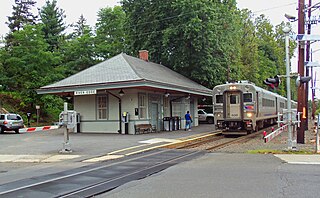
River Edge is a New Jersey Transit rail station on the Pascack Valley Line. The station is one of two rail stations in River Edge, New Jersey and is located at River Edge Road and Park Avenue, one block east of Kinderkamack Road and three blocks west of River Road.
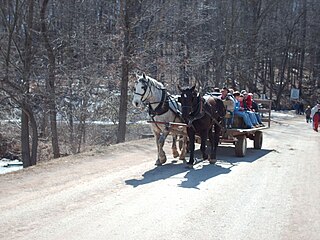
Malabar Farm State Park is a state park in Richland County, Ohio, United States, located near Lucas and the Mohican State Park.
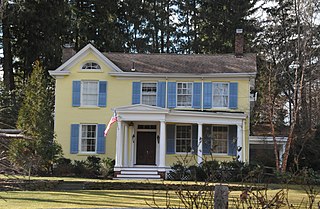
Towaco is an unincorporated community and census-designated place (CDP) in the township of Montville, Morris County, New Jersey, United States. As of the 2020 census, it had a population of 5,624.

Bascom Maple Farms, Inc., is a privately held company based at the Bascom Maple Farm in Acworth, New Hampshire, with a mailing address of Alstead, New Hampshire. Officers of the company include President Bruce Bascom and Vice-Presidents David Bascom and Kevin Bascom.
The Broadway Bus Terminal is a major local and regional bus terminal in Paterson, New Jersey operated by New Jersey Transit. It is located on Broadway between Memorial Drive and West Broadway in Downtown Paterson, putting it near Passaic County Community College and a few blocks from Paterson City Hall and the Great Falls Historic District, including the Great Falls.

Byne Blueberry Farms is an organic blueberry farm in Waynesboro, Georgia. It is one of the earliest and most famous organic farms in the United States. Byne Blueberry Farms was started in 1980, before there was a National Organic Program, when owner Dick Byne became the first commercial blueberry grower in the Central Savannah River Area. Whole Foods and Earth Fare are some of the farm's biggest consumers. Privately owned by Dick Byne and his wife Linda Byne, the family runs the farm themselves with the help of their four daughters Diane, Janie, AnnNell, and Marian. The blueberries are grown on 20 of the 400 acres that have been in the Byne family for generations. The remaining 380 acres have been preserved as forest. The specific species of blueberry grown on the farm is the Rabbiteye blueberry, which is reputed for its sweetness and high level of fructose. This kind of blueberry is the most popular type of blueberry grown in the south. The farm was certified as organic in 1997, following a three-year certification process.
The Big North Conference is a high school athletic conference in New Jersey. It is one of six North Jersey "super athletic conferences" created by the New Jersey State Interscholastic Athletic Association (NJSIAA) in 2009. There are 41 member schools in the Big North Conference, with all members located in either Bergen County or Passaic County, New Jersey.
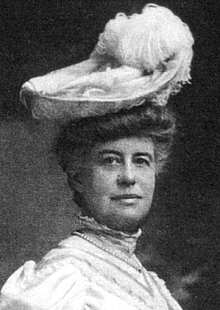
Helena Ely Fairchild was an American amateur gardener, founding member of the Garden Club of America, and writer, whose three books influenced American and British gardeners to avoid Victorian formal gardens in favor of plantings that embodied an "informal and sensual style." She focused on planning her gardens around planting "hardy perennial plants found in the agricultural landscape."

Crown Maple Syrup is a certified organic maple syrup company based in Dover Plains, NY. The company was established by Robb Turner in 2010. The sap used to produce maple syrup comes from tapped maple trees in areas ranging from the Hudson Valley to Western Vermont. The syrup is processed and bottled at Madava Farms on an 800-acre site. The farm is considered to be the largest maple syrup production facility in North America.

